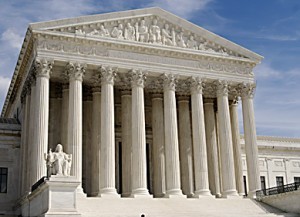SCOTUS sets stage for Obamacare legal victory

The U.S. Supreme Court announced Monday that it intends to examine the legal footing of Obamacare. Administration officials remain confident that the Affordable Care Act (ACA) will be deemed constitutional by the High Court and has asked justices to expedite their review of legal challenges to the new tax so states can begin to implement it in earnest. Opponents have pinned their hopes on overturning two appellate court decisions, which have upheld ACA, by contesting the law's most controversial element-the individual insurance mandate. But, the White House has reason to be optimistic about the fate of its legislative baby. The administration must have a gut feeling that the Supreme Court will hold fast to a legal precedent it established back in 2005, that of what some call a politically-motivated interpretation of the Constitution's Commerce Clause.
Rewind six years to the Supreme Court ruling in Gonzalez v. Raich. It was a medical marijuana case that baffled states' rights advocates when their man on the bench, Antonin Scalia, joined the majority opinion to uphold DEA crackdowns on residential marijuana cultivation. Plaintiffs Diane Monson and Angel Raich thought it was a cut and dry case: the pot they were growing was for their own personal, medicinal use. It wasn't being traded, or sold. It wasn't even leaving the plaintiffs' respective properties. Also, their activities were fully permitted by the state. From a textbook perspective on Constitutional law, the aforementioned facts suggest that the DEA raids which destroyed the plants were illegal.
In practice, law is never so black and white.
In a 6 to 3 decision, Supreme Court Justices ruled against Monson and Raich, saying that intrastate, noncommercial backyard marijuana cultivation was still a part of (even if just 'potentially') a greater interstate market and thus fell under the purview of federal commercial regulators. Scalia, in concurrence with the majority of justices in the case, reminded would-be pharmaceutical entrepreneurs:
“Where necessary to make a regulation of interstate commerce effective, Congress may regulate even those intrastate activities that do not themselves substantially affect interstate commerce."
By ruling in favor of DEA actions that destroyed two private marijuana grow sites, justices in that case only added inertia to a long-established movement by the courts away from 10th Amendment protections of individual freedoms towards a new system of constitutional protections that sees corporations as people and the object of “regulating commerce” as an end in and of itself.
So what does the the plight of Monson and Raich have to do with the survival of “socialized” medicine? Sixth Circuit Judge Jeffery Sutton, a former clerk for Justice Antonin Scalia and Bush Jr. appointee, summed up the connection in his recent opinion upholding Obamacare. Sutton wrote:
"If Congress could regulate Angel Raich when she grew marijuana on her property for self-consumption, it is difficult to say Congress may not regulate the 50 million Americans who self-finance their medical care."
One could say then, if the only tool in your toolbox is a hammer, then every problem will surely resemble a nail. If you are the federal government and your only claims for legislative authority over states come from “incorporation theory” (embodied in the 14th amendment) and the Commerce Clause, well then, every problem becomes a commercial one. As long as individuals act “in commerce”, they would appear to be at the mercy of the federal regulators and Uniform Commercial Code.
I would expect the courts to do the predictable thing and rubber stamp a revenue-generating expansion to the federal bureaucracy. We might even get to see them do it in the middle of a presidential election year.




